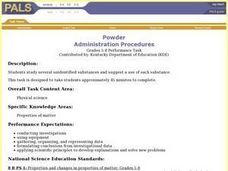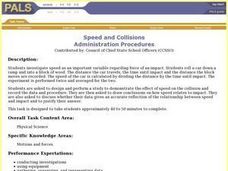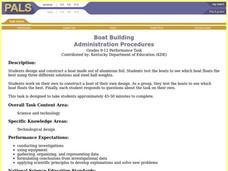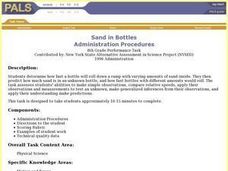Curated OER
Catalase Enzyme
Pupils design and conduct an experiment to test their ideas about how to speed up or slow down the rate of an enzyme-catalyzed reaction. They have access to an array of physical and chemical factors that might influence enzyme activity....
Curated OER
Whose Parts Do I Have? (Wings and Things)
Pupils identify an animal and a body part and then matches a body part to a specific animal. This will assess their ability to sort organisms and objects into groups according to their parts and describe how the groups are formed and...
Curated OER
Hlf-Ball
Young scholars investigate Newton's Laws of Motion and the Law of Conservation of Energy. They examine how a ball and half-ball behave and relate these laws to what happens to the ball. Students produce a graph of the data collected...
Curated OER
Temperature and Enzymes
Students compare the times it takes the milk in each of two cups to curdle. They are told that an enzyme that is added to the milk, rennin, is involved in the natural curdling process of milk. Students are asked to consider what...
Curated OER
Rubber Band
Eighth graders investigate what would happen to the length of a rubber band as more and more rings were hung on it. They base their explanation on what they observed, and as they develop cognitive skills, they should be able to...
Curated OER
Acid and Base Testing 2
Students design and conduct an experiment on unknown solutions after studying descriptions of indicators and the way in which they identify acids and bases. Students must gather, organize, and analyze data as well as make inferences...
Curated OER
Height of Bounce
Eighth graders determine the relationship between the height of bounce of a ping-pong ball and the height from which it was dropped. They are assessed on the ability to record and interpret data, graph data, make predictions, and make...
Curated OER
Changes in Pulse Rate
Eighth graders practice making observations and collecting data after determining a baseline pulse rate then collect data on the changes in that rate with exercise. Students must organize their data and analyze their observations.
Curated OER
Mapping the Blue Part
Eighth graders determine the location of specific features of the stimulated ocean floor. The features include the continental shelf, continental slope, an ocean trench, and a mid-oceaniz ridge.
Curated OER
Magnifiers
Students describe how several different objects magnify a provided sentence and decide if they are good magnifiers or not. They then write a sentence describing two properties an object must have in order to be a good magnifier.
Curated OER
Packing Materials
Students observe the effects of water on four different packing materials to determine which ones are more soluble. They then decide which material would be a good packing material to use for the environment and which may be a bad...
Curated OER
Density of a Sinker
Eighth graders determine the density of a sinker by first finding the mass and then the volume using a graduated cylinder. Students must write the procedure they use to find the volume of the sinker then apply their data to follow-up...
Curated OER
Insulators
Students design and carry out an investigation to test which materials is the best insulator: they predict which way heat energy flows in a system and analyze the flow of energy in a system from one point to another and from one form to...
Curated OER
Unknown Liquids
Students must design and conduct an experiment to determine which unknown liquid has a greater density based on basic information about the liquids and containers. Students are given specific materials to work with.
Curated OER
Powder
Students investigate several unidentified substances and suggest a use of each substance. They can explain that a substance has characteristic properties, such as density, a boiling point, and solubility, all of which are independent of...
Curated OER
Building Materials
Fifth graders are presented with three rocks and a variety of tools and are asked to investigate the properties of the rocks to see which rock is best for building tables and benches for a museum picnic area.
Curated OER
How Effective is Perspiration at Cooling?
Students collect data on the cooling of water in two different test tubes, one that is wrapped in wet newspaper and one in dry newspaper. They then relate this cooling effect to the body's perspiration.
Curated OER
Speed and Collisions Administration Procedures
Young scholars investigate speed as an important variable regarding force of an impact. Students roll a car down a ramp and into a block of wood. The distance the car travels, the time until impact and the distance the block moves are...
Curated OER
Exploring the MapleCopter
Study explore the motion of maple seeds and design experiments to explain their spinning flight patterns. They make observations, explain ideas of motion, use models, analyze previous reports and experiments, identify relevant factors...
Curated OER
Boat Building
Students design and contrast a boat made out of aluminum foil. They test the boats to see which boat floats the best using three different solutions and steel ball weights. Students work on their own to construct a boat of their own...
Curated OER
Are Fruits And Vegetables Really Made of Cells?
Students design and carry out an exercise to determine if a given fruit or vegetable is composed of cells. They dissect out sections of the fruit or vegetable, prepare stained slides, and make observations under a compound microscope.
Curated OER
Rate of Cooling Experiment
Ninth graders measure the insulation properties of different fabrics by immersing cans of water covered with fabric "socks" in an ice bath and measuring temperature changes. They then calculate heat loss and graph the data individually.
Curated OER
Density and Buoyancy Experimental Design
Students must plan, design, and conduct an experiment that answers the scientific question: "Come up with a question that addresses the factors (variables) of the water and its effect on whether an object floats or sinks."
Curated OER
Sand in Bottles
Eighth graders calculate the speed of bottles as they roll down a ramp with varying amounts of sand inside. Using their data, 8th graders estimate speed of three labeled bottles with different amounts of sand and compare those results...

























